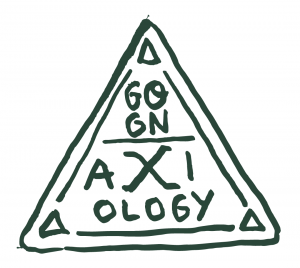Axiology
Axiology is the study of values and value judgements (literally “rational discourse about values [axía]”). In philosophy this field is subdivided into ethics (the study of morality) and aesthetics (the study of beauty, taste and judgement). For the hard-nosed scientist the relevance of axiology might not be obvious. After all, what difference do one’s feelings make for the data collected? Don’t we spend a long time trying to teach researchers to be objective?
Like ontology and epistemology, the import of axiology is typically built into research paradigms and exists “below the surface”. You might not consciously engage with values in a research project, but they are still there. Similarly, you might not hear many researchers refer to their axomatic commitments but they might well talk about their values and ethics, their positionality, or a commitment to social justice.
Our values focus and motivate our research. These values could include a commitment to scientific rigour, or to always act ethically as a researcher. At a more
general level we might ask: What matters? Why do research at all? How does it contribute to human wellbeing?
Almost all research projects are grounded in trying to answer a question that matters or has consequences. Some research projects are even explicit in their intention to improve things rather than observe them; this is most closely associated with “critical” approaches.

